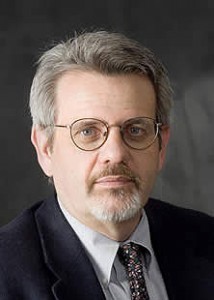 Dr. Ken Snowden, an associate professor of economics and director of graduate studies in the Bryan School of Business and Economics at The University of North Carolina at Greensboro, will testify before the U.S. Senate Committee on Banking, Housing & Urban Affairs Wednesday, Sept. 15.
Dr. Ken Snowden, an associate professor of economics and director of graduate studies in the Bryan School of Business and Economics at The University of North Carolina at Greensboro, will testify before the U.S. Senate Committee on Banking, Housing & Urban Affairs Wednesday, Sept. 15.
He will address the committee during a panel discussion on “Covered Bonds: Potential Uses and Regulatory Issues.”
An economic historian, Snowden has studied the historical development of the mortgage market in the U.S. for more than 20 years. His research has become particularly relevant in light of the mortgage crisis that contributed to the nation’s economic recession.
In recent years, lenders have utilized a securitization process where mortgage loans were sold and repackaged, Snowden said. With covered bonds, “instead of selling the mortgage, the intermediary holds on to it and uses it as collateral for bonds they issue,” he said.
“The key advantage that people talk about with covered bonds is that issuers keep ‘skin in the game.’ What that means is they’re retained some of the risk. That’s their skin. Hopefully, that’ll make them more careful in what mortgages they make.”
The covered bond model has been widely used in European markets, where it has performed better than securitization, he said. “What Congress is trying to do right now is see if there needs to be legislation or regulatory action to encourage the development of the covered bond market.”
If legislators encourage movement in that direction, it’ll be a return to a model used decades ago. “We actually had covered bonds systems before 1940 in the United States,” Snowden said. He’s one of only a few scholars who have studied those markets extensively “so I can provide some historical perspective on how well they worked and the regulations that were implemented at the time.
“I’m the only historian on the panel. Everyone else is either a regulator or folks in current financial markets. My job is to provide a little historical context.”
Snowden spent the weekend preparing a paper for the Senate Banking Committee that he’ll submit prior to his testimony. On the day of the event, he’ll give five to seven minutes of verbal testimony and be available to answer questions from committee members.
After the testimony, he’ll hop a plane back to Greensboro to teach class. For an academic who has dedicated countless hours to his research, it’s a sacrifice he’s happy to make.
“I was happy to be asked and I’m happy to contribute,” Snowden said. “That’s why we do this work, hoping it can matter in some way.”
PDF of Testimony HERE
View Video HERE
By Lanita Withers Goins
Photography by Chris English
![]()